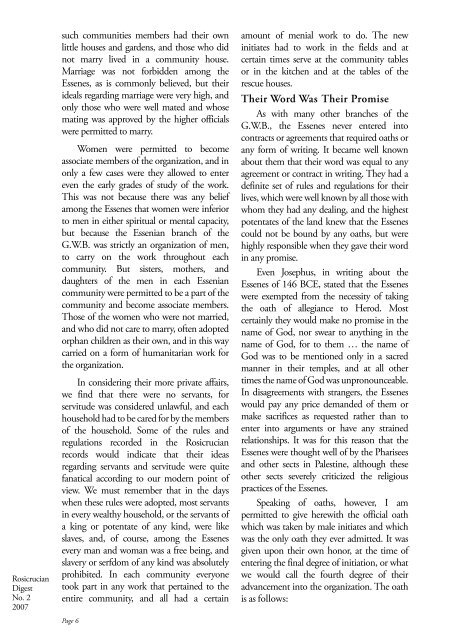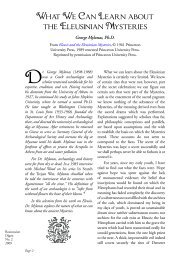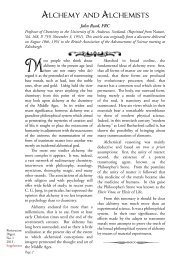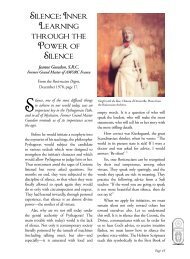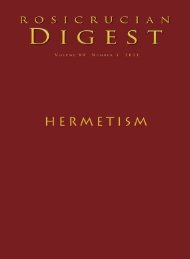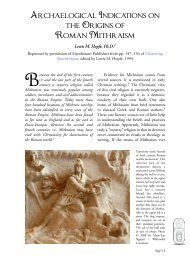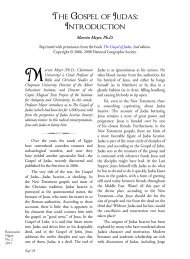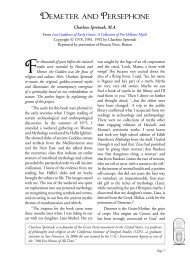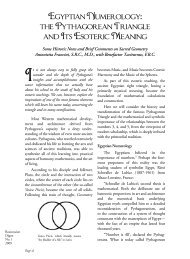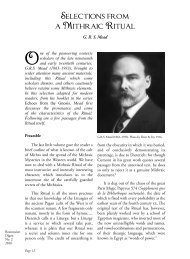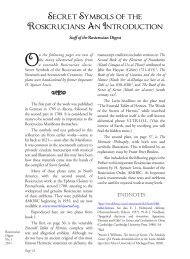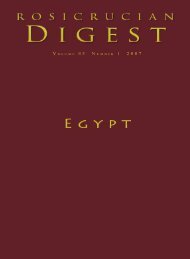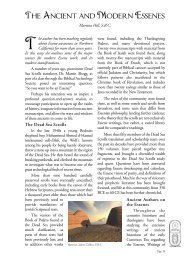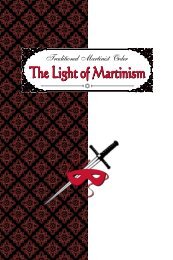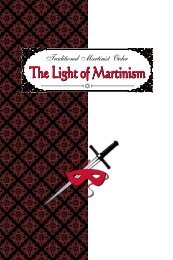Rosicrucian Digest Vol 85 Number 2 2007 - Rosicrucian Order
Rosicrucian Digest Vol 85 Number 2 2007 - Rosicrucian Order
Rosicrucian Digest Vol 85 Number 2 2007 - Rosicrucian Order
Create successful ePaper yourself
Turn your PDF publications into a flip-book with our unique Google optimized e-Paper software.
<strong>Rosicrucian</strong><br />
<strong>Digest</strong><br />
No. 2<br />
<strong>2007</strong><br />
such communities members had their own<br />
little houses and gardens, and those who did<br />
not marry lived in a community house.<br />
Marriage was not forbidden among the<br />
Essenes, as is commonly believed, but their<br />
ideals regarding marriage were very high, and<br />
only those who were well mated and whose<br />
mating was approved by the higher officials<br />
were permitted to marry.<br />
Women were permitted to become<br />
associate members of the organization, and in<br />
only a few cases were they allowed to enter<br />
even the early grades of study of the work.<br />
This was not because there was any belief<br />
among the Essenes that women were inferior<br />
to men in either spiritual or mental capacity,<br />
but because the Essenian branch of the<br />
G.W.B. was strictly an organization of men,<br />
to carry on the work throughout each<br />
community. But sisters, mothers, and<br />
daughters of the men in each Essenian<br />
community were permitted to be a part of the<br />
community and become associate members.<br />
Those of the women who were not married,<br />
and who did not care to marry, often adopted<br />
orphan children as their own, and in this way<br />
carried on a form of humanitarian work for<br />
the organization.<br />
In considering their more private affairs,<br />
we find that there were no servants, for<br />
servitude was considered unlawful, and each<br />
household had to be cared for by the members<br />
of the household. Some of the rules and<br />
regulations recorded in the <strong>Rosicrucian</strong><br />
records would indicate that their ideas<br />
regarding servants and servitude were quite<br />
fanatical according to our modern point of<br />
view. We must remember that in the days<br />
when these rules were adopted, most servants<br />
in every wealthy household, or the servants of<br />
a king or potentate of any kind, were like<br />
slaves, and, of course, among the Essenes<br />
every man and woman was a free being, and<br />
slavery or serfdom of any kind was absolutely<br />
prohibited. In each community everyone<br />
took part in any work that pertained to the<br />
entire community, and all had a certain<br />
Page 6<br />
amount of menial work to do. The new<br />
initiates had to work in the fields and at<br />
certain times serve at the community tables<br />
or in the kitchen and at the tables of the<br />
rescue houses.<br />
Their Word Was Their Promise<br />
As with many other branches of the<br />
G.W.B., the Essenes never entered into<br />
contracts or agreements that required oaths or<br />
any form of writing. It became well known<br />
about them that their word was equal to any<br />
agreement or contract in writing. They had a<br />
definite set of rules and regulations for their<br />
lives, which were well known by all those with<br />
whom they had any dealing, and the highest<br />
potentates of the land knew that the Essenes<br />
could not be bound by any oaths, but were<br />
highly responsible when they gave their word<br />
in any promise.<br />
Even Josephus, in writing about the<br />
Essenes of 146 BCE, stated that the Essenes<br />
were exempted from the necessity of taking<br />
the oath of allegiance to Herod. Most<br />
certainly they would make no promise in the<br />
name of God, nor swear to anything in the<br />
name of God, for to them … the name of<br />
God was to be mentioned only in a sacred<br />
manner in their temples, and at all other<br />
times the name of God was unpronounceable.<br />
In disagreements with strangers, the Essenes<br />
would pay any price demanded of them or<br />
make sacrifices as requested rather than to<br />
enter into arguments or have any strained<br />
relationships. It was for this reason that the<br />
Essenes were thought well of by the Pharisees<br />
and other sects in Palestine, although these<br />
other sects severely criticized the religious<br />
practices of the Essenes.<br />
Speaking of oaths, however, I am<br />
permitted to give herewith the official oath<br />
which was taken by male initiates and which<br />
was the only oath they ever admitted. It was<br />
given upon their own honor, at the time of<br />
entering the final degree of initiation, or what<br />
we would call the fourth degree of their<br />
advancement into the organization. The oath<br />
is as follows:


